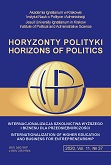Krytyka imperialnego Rzymu w Apokalipsie św. Jana we współczesnych interpretacjach egzegetycznych
Critique of Imperial Rome in the Revelation of St. John in Contemporary Exegetical Interpretations
Author(s): Marek KarczewskiSubject(s): Christian Theology and Religion, Ancient World, Biblical studies
Published by: Uniwersytet Ignatianum w Krakowie
Keywords: Revelation of St. John; Rev 13:1‑18; Rev 17‑18; great Babylonia; prophecy in Rev;
Summary/Abstract: RESEARCH OBJECTIVE: The basic scientific aim of this article is to indicate the main research perspectives presented by exegetes who analyze the problem of criticism of imperial Rome in the Revelation of St. John. THE RESEARCH PROBLEM AND METHODS: In the Rev the Roman Empire is seen as hostile to Christianity. Texts related to Rome can be interpreted in different ways. The exegetes are analyzing the Sitz im Leben , complex symbolism, relationships with ancient literature. However Rev belongs to canon of the Holy Bible. The problem of polemics with imperial Rome can also considered in relation to the eschatology and propheticism of Rev. To define the main ways of exegetical interpretation were analyzed contemporary scientific publications. Then the main research stands were synthesized. THE PROCESS OF ARGUMENTATION: First, were briefly discussed problems related to historical circumstances of the book’s writing. At the second point were presented texts and symbols of Rev, which refer to imperial Rome. Third: are discussed three main research perspectives present in the scientific literature. These are: historical perspective; ethical, theological and moral dimension; an eschatological and prophetic perspective. RESEARCH RRESULTS: Analysis of contemporary exegetical literature allows for the following conclusions. Some exegetes focus their research on the historical context of criticism of Rome in Rev. They limit research to the historical aspect. Others go further. In anti Roman symbols they see timeless ethical and moral theological content. In addition, a large group of exegetes associate their historical research with the eschatological and prophetic dimensions of Rev. CONCLUSIONS, INNOVATIONS, RECOMMENDATIONS: It is important that researchers who see in Rev a book inspired by God, don’t lose contact with scientists studying historical literary, historical religious and philological aspects of this book. However, in research from a theological perspective exegetes should not ignore the prophetic message contained in the criticism of imperial Rome.
Journal: Horyzonty Polityki
- Issue Year: 11/2020
- Issue No: 34
- Page Range: 109-123
- Page Count: 15
- Language: Polish

